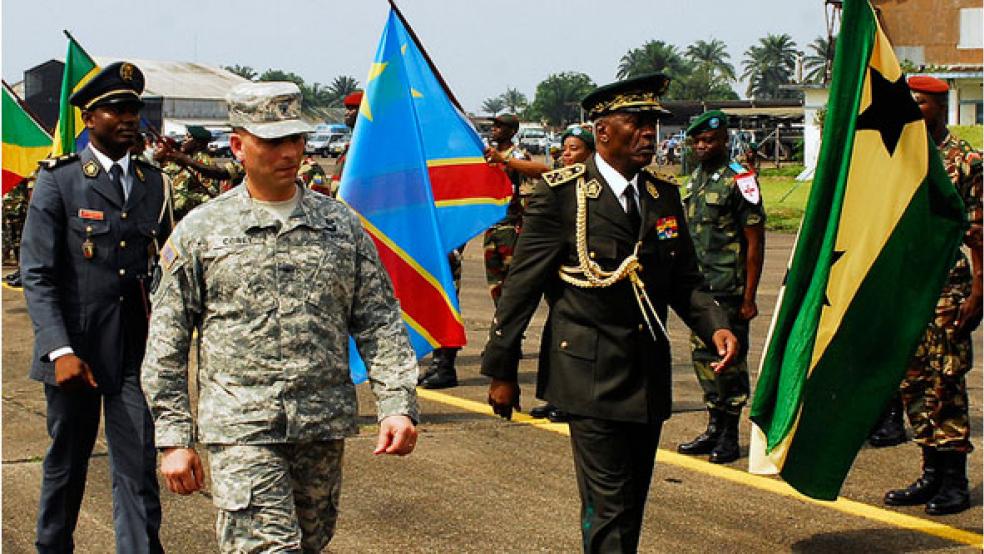The war in Afghanistan is drawing to a close, marking the end of more than a decade of continuous fighting in big, traditional conflicts. But even as the wars in Iraq and Afghanistan wind down, the United States is already committing to a series of smaller engagements in Africa that have the dangerous potential to become larger conflicts.
The U.S. military has a presence in the Central African Republic, where U.S. special operators are assisting in the hunt for Ugandan warlord Joseph Kony. The Pentagon is building drone bases in Chad and Niger. In Nigeria, U.S. troops are training the local military to fight against the Muslim extremist group, Boko Haram. They’re also supporting the NATO mission in Mali and have drones flying over both Somalia and Kenya. From the Republic of Djibouti in the horn of Africa, U.S. troops coordinate missions across the continent.
Those are the missions we know about—all from unclassified documents. It’s highly likely, however, that the military is active elsewhere on the continent, but where, with how many personnel, and with what mission is still top secret.
Also hidden from the public eye is the cost of these programs. U.S. Africa Command, known as AFRICOM, had a budget of $298 million in 2012, a pittance within a defense budget of more than $800 billion. But since many of the programs that are active in Africa are clandestine, it’s impossible to know how much is actually being spent.

What’s clear, however, is that U.S. commitments in Africa are growing—and are likely to keep growing as the continent becomes a safe haven for factions of al Qaeda.
“We’ve seen deployment of drone bases. We have seen military assistance and training programs,” said John Norris, executive director of the Sustainable Security and Peacebuilding Initiative at the liberal-leaning Center for American Progress. “When you play the counterterrorism card, people say, ‘Let the Defense Department do what it wants.’”
The danger with small wars, however, is that they don’t stay small. Consider Vietnam: At the start of that conflict, only a small number of troops were deployed. A decade later, nearly 58,000 Americans had died there.
Here are three countries that could pull the United States into a larger war.
NIGERIA
The United States isn’t in Nigeria just to fight Boko Haram. The country is the fifth largest supplier of oil to the U.S., exporting a kind of oil that can easily be turned into gasoline, which keeps global market prices down.
Boko Haram, based in the northern half of Nigeria, has repeatedly threatened to invade the southern and mostly Christian part of the country. In response to the threat, Christian militants in the south have threatened to retaliate.
A civil war in Nigeria would inevitably disrupt the country’s oil output, which could force the United States to intervene to keep the oil flowing. In fact, the U.S. has labeled Nigeria among its “strategic national interests.” The U.S. military is willing to intervene to prevent conflicts that would impact the oil industry there.
SOUTH SUDAN
South Sudan is the world’s youngest country: The central African country became independent from neighboring Sudan in 2011.
Ever since, hostilities between the two have been at a fever pitch. Ethnic groups in both nations have long found reasons to fight, but their current conflicts are about oil resources. On numerous occasions since South Sudan’s independence, Sudan has refused to allow oil to pass through Sudanese pipelines to the new country. This has disrupted the world’s oil supply and led to military conflict in 2012 between the sides.
American companies have billions invested in South Sudan, and the State Department has continually lambasted both sides for oil disruptions. If a war between the two breaks out, the U.S. might be forced to intervene to keep the oil flowing. Andrew Natsois, a Sudan expert at Georgetown University, has made the case that military intervention is already necessary.
MALI
The U.S. is already taking part in foreign military involvement in Mali, a country where the Muslim militant group al Qaeda Islamic Maghreb (AQIM) is attempting to overthrow the government. So far, this involvement has been limited to air support.
But if AQIM does gain control of the country, U.S. ground troops might be dispatched to restore order. If Mali were to fall to terrorists, there is risk of a domino affect: Countries with weak governments and a strong Islamic presence like Niger and Chad might also become targets for extremism. This would create another pre-2001 Afghanistan in the middle of Africa.
Defense officials have already hinted that the U.S. might send troops to Mali if the French military, which is currently leading the offensive, is unsuccessful.
“We’re concerned that any time Al Qaeda establishes a base of operations, while they might not have any immediate plans for attacks in the United States and in Europe, that ultimately that still remains their objective,” former Defense Secretary Leon Panetta said recently. “We have to take steps now to make sure that AQIM does not get that kind of traction.”





